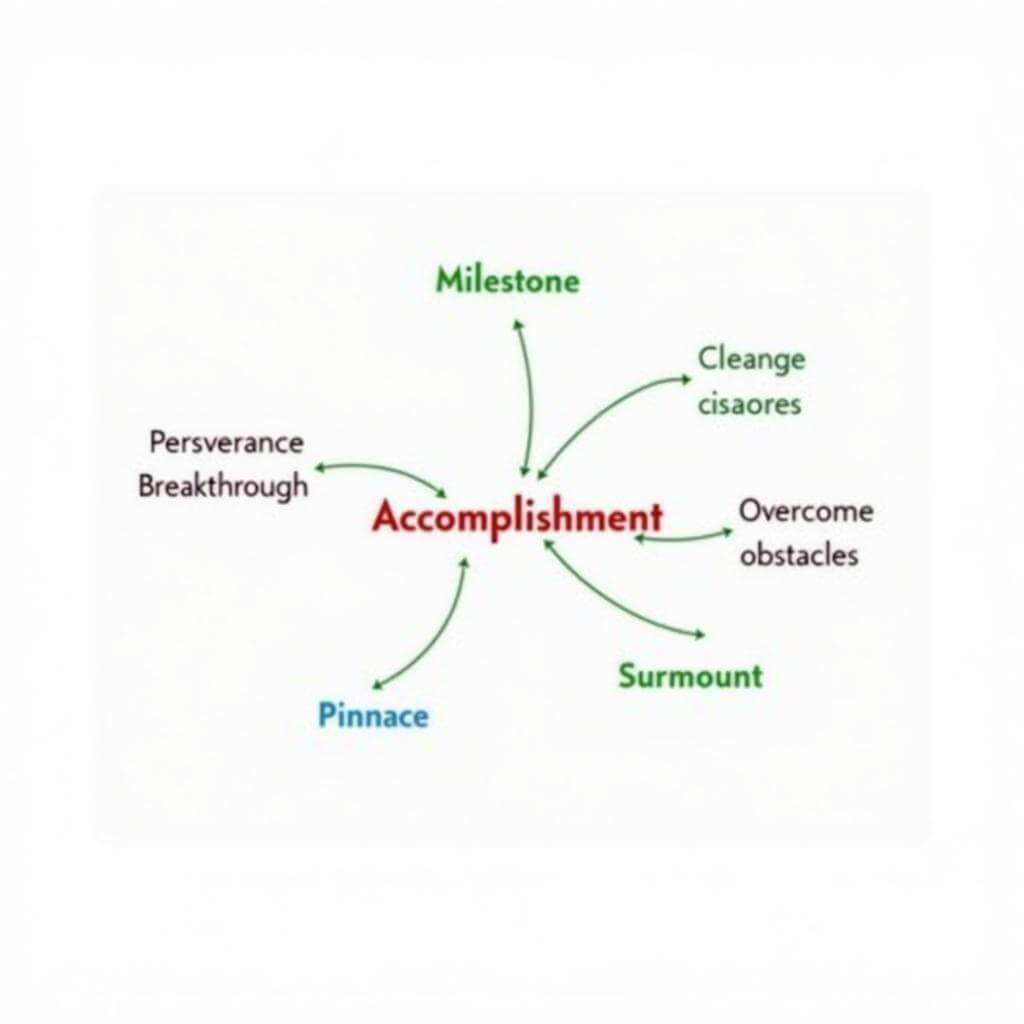The topic of describing a time when you felt a sense of accomplishment is a popular one in IELTS Speaking tests. It allows examiners to assess your ability to narrate personal experiences, express emotions, and use a range of vocabulary related to achievements and feelings. This topic has appeared frequently in past IELTS exams and is likely to remain relevant in future tests. Let’s explore how to approach this topic effectively across all parts of the IELTS Speaking test.
Part 1: Introduction and Interview
In Part 1, the examiner may ask general questions about achievements and accomplishments. Here are some potential questions and sample answers:
- Do you often feel a sense of accomplishment?
Sample answer (Band 7-8):
“Yes, I’d say I experience a sense of accomplishment fairly regularly. I try to set realistic goals for myself, both in my personal life and at work, and I feel a great sense of satisfaction when I achieve these objectives. It could be something as simple as completing a challenging workout or as significant as finishing a major project at work. I believe it’s important to acknowledge and celebrate these accomplishments, no matter how small they may seem.”
- What kinds of things give you a feeling of accomplishment?
Sample answer (Band 8-9):
“A wide range of activities can give me a feeling of accomplishment. In my professional life, successfully completing a demanding project or receiving positive feedback from clients brings a profound sense of achievement. On a personal level, I find great satisfaction in mastering a new skill, whether it’s learning a musical instrument or improving my language abilities. Additionally, I feel a deep sense of accomplishment when I’m able to make a positive impact on others’ lives, such as through volunteering or mentoring. These experiences not only boost my self-esteem but also motivate me to set and pursue even more ambitious goals.”
Describe a time when you felt proud of a close friend
Part 2: Long Turn
Here’s a sample cue card related to the topic:
Describe a time when you felt a strong sense of accomplishment
You should say:
- What the accomplishment was
- When and where it happened
- Why you felt a sense of accomplishment
- And explain how this experience affected you
Sample answer (Band 6-7):
“I’d like to talk about a time when I felt a strong sense of accomplishment. It was when I successfully organized a charity event for my local community last year.
The event took place in our town’s community center about six months ago. I was responsible for coordinating everything from finding sponsors to managing volunteers and ensuring the event ran smoothly on the day.
I felt a real sense of accomplishment because it was the first time I had taken on such a big responsibility. We managed to raise a significant amount of money for a local children’s hospital, which made all the hard work worthwhile.
This experience affected me in many ways. It boosted my confidence and showed me that I could handle complex tasks. It also made me realize how rewarding it can be to give back to the community. Since then, I’ve been more involved in volunteer work and have even considered a career in non-profit organizations.”
Sample answer (Band 8-9):
“I’d like to share an experience that gave me an overwhelming sense of accomplishment. It was the successful completion of my first marathon, which I ran in New York City last autumn.
The event took place on a crisp November morning, with the city’s iconic skyline serving as a backdrop. I had spent months rigorously training for this moment, dedicating countless early mornings and weekends to building my endurance and mental fortitude.
The sense of accomplishment I felt was profound and multifaceted. Firstly, crossing the finish line after 26.2 miles was a testament to my physical and mental resilience. I had pushed my body to its limits and overcome moments of self-doubt during the race. Secondly, this achievement represented the culmination of a personal journey that began with a commitment to improving my health and challenging myself beyond my perceived limitations.
This experience had a transformative effect on me. It instilled a deep-seated belief in my ability to set and achieve ambitious goals, not just in athletics but in all aspects of life. The discipline and perseverance I developed through training have translated into enhanced productivity in my professional life. Moreover, the experience taught me the value of incremental progress and the importance of celebrating small victories along the way to a larger goal. Perhaps most significantly, it sparked a passion for endurance sports that has become an integral part of my lifestyle, providing a continuous source of challenge and fulfillment.”
Describe a recent project you completed
Follow-up questions:
- How did you celebrate this accomplishment?
Sample answer (Band 8-9):
“After completing the marathon, I indulged in a well-deserved celebration. I organized a small gathering with close friends and family who had supported me throughout my training journey. We enjoyed a sumptuous meal at my favorite restaurant, where I allowed myself to savor dishes I had been avoiding during my strict training regimen. Beyond the immediate celebration, I also treated myself to a weekend getaway at a spa resort to help my body recover and reflect on the achievement. This celebration was not just about marking the end of the marathon but also acknowledging the dedication and perseverance that led to this accomplishment.”
- Do you think it’s important to set goals for yourself?
Sample answer (Band 8-9):
“Absolutely, I believe setting goals is crucial for personal growth and fulfillment. Goals provide direction and purpose, acting as a roadmap for our aspirations. They help us focus our efforts and resources effectively, preventing us from becoming stagnant or complacent. Moreover, the process of working towards goals can be incredibly rewarding, fostering resilience, self-discipline, and problem-solving skills. However, it’s important to strike a balance – goals should be challenging yet attainable, and we should be flexible enough to adjust them as circumstances change. Ultimately, well-defined goals can lead to a more satisfying and purposeful life, as they allow us to measure our progress and celebrate our achievements along the way.”
Part 3: Two-way Discussion
In Part 3, the examiner will ask more abstract questions related to the topic. Here are some potential questions and sample answers:
- Why do you think some people never feel a sense of accomplishment?
Sample answer (Band 7-8):
“There could be several reasons why some individuals struggle to feel a sense of accomplishment. One factor might be unrealistic expectations – if people set impossibly high standards for themselves, they may never feel satisfied with their achievements. Another reason could be a lack of self-awareness or inability to recognize their own progress and growth. Some people might also suffer from low self-esteem, which can make it difficult to acknowledge their own successes. Additionally, constant comparison with others, especially in the age of social media, can lead to feelings of inadequacy and diminish one’s sense of accomplishment.”
Sample answer (Band 8-9):
“The inability to feel a sense of accomplishment is a complex issue that can stem from various psychological and social factors. One significant contributor could be a perfectionist mindset, where individuals set unattainably high standards for themselves, leading to perpetual dissatisfaction with their achievements. This perfectionism often breeds a fear of failure, which can be paralyzing and prevent people from taking risks or pursuing challenging goals.
Another crucial factor is the lack of intrinsic motivation. When people pursue goals that are not aligned with their personal values or interests, but rather driven by external pressures or societal expectations, they may struggle to derive genuine satisfaction from their accomplishments.
Moreover, in our hyper-connected world, the constant exposure to others’ curated successes on social media can foster a culture of comparison, leading to what psychologists call ‘relative deprivation‘. This phenomenon can make people feel that their own achievements are insignificant in comparison to others, regardless of their objective merit.
Lastly, some individuals may have experienced early life experiences or trauma that have shaped their self-perception and ability to recognize their own worth. This could result in a persistent negative self-image that filters out positive feedback and accomplishments, making it challenging to internalize a sense of achievement.”
- How do cultural differences affect people’s sense of accomplishment?
Sample answer (Band 8-9):
“Cultural differences can significantly influence people’s sense of accomplishment in various ways. In collectivist cultures, such as those found in many Asian countries, accomplishments are often viewed through the lens of how they benefit the family or community rather than the individual. This perspective can lead to a sense of accomplishment that is deeply tied to fulfilling social responsibilities and maintaining harmony.
Conversely, in more individualistic societies, like those in North America and parts of Europe, personal achievements and self-realization are often highly valued. This cultural orientation can foster a stronger emphasis on individual accomplishments and may lead to a greater sense of personal pride in one’s achievements.
The definition of success itself can vary dramatically across cultures. In some societies, academic or professional achievements might be the primary source of accomplishment, while in others, spiritual growth, maintaining strong family ties, or contributing to the community might be considered more significant accomplishments.
Moreover, cultural attitudes towards modesty and self-promotion can affect how accomplishments are perceived and expressed. In cultures that value humility, individuals might feel uncomfortable celebrating their achievements publicly, which could impact their outward expression of accomplishment, even if they feel it internally.
Cultural differences also influence the timeframe in which accomplishments are evaluated. Some cultures place great importance on long-term achievements and life-long learning, while others might focus more on short-term goals and immediate results.
Lastly, the concept of failure and its relationship to accomplishment can vary culturally. In societies where failure is seen as a natural part of the learning process, people might feel a sense of accomplishment even in setbacks, viewing them as stepping stones to eventual success. In contrast, cultures with a lower tolerance for failure might lead individuals to feel accomplished only when they achieve perfect or near-perfect results.”
Describe a personal project you completed successfully
Key Vocabulary and Phrases
To achieve a high score in IELTS Speaking when discussing accomplishments, consider using these advanced words and phrases:
-
Overcome obstacles /ˌəʊvəˈkʌm ˈɒbstəkəlz/ (phrasal verb): To succeed in dealing with a problem or difficulty.
Example: “I had to overcome numerous obstacles to complete the project on time.” -
Milestone /ˈmaɪlstəʊn/ (noun): An important event in the development or history of something or in someone’s life.
Example: “Graduating from university was a significant milestone in my academic journey.” -
Perseverance /ˌpɜːsɪˈvɪərəns/ (noun): Continued effort and determination, despite difficulties or delays in achieving success.
Example: “My success was largely due to my perseverance in the face of numerous setbacks.” -
Pinnacle /ˈpɪnəkl/ (noun): The most successful or admired part of something or someone’s career.
Example: “Winning the national championship was the pinnacle of my sporting career.” -
Surmount /səˈmaʊnt/ (verb): To overcome a difficulty or problem.
Example: “With determination and hard work, we were able to surmount all the challenges we faced.” -
Breakthrough /ˈbreɪkθruː/ (noun): An important discovery or development that helps to solve a problem.
Example: “After months of research, we finally had a breakthrough in our project.”
Describe a time when you taught someone something new
 IELTS Speaking: Vocabulary for describing accomplishments
IELTS Speaking: Vocabulary for describing accomplishments
Examiner’s Advice
To excel in the IELTS Speaking test when discussing accomplishments:
-
Use a range of vocabulary: Incorporate advanced words and phrases related to achievements and emotions to demonstrate your language proficiency.
-
Provide specific examples: When describing your accomplishments, give detailed accounts that include when, where, and why the event was significant to you.
-
Express emotions: Don’t just state facts; convey how you felt about your accomplishment using a variety of descriptive language.
-
Use appropriate tenses: Ensure you use the correct tenses when narrating past events and discussing their impact on the present.
-
Practice fluency: Work on speaking smoothly and confidently about your achievements without long pauses or hesitations.
-
Develop your ideas: In Part 3, try to give extended answers that explore different aspects of the topic and demonstrate critical thinking.
-
Stay relevant: Always keep your responses focused on the question asked, using your personal experiences to support your points.
By following these tips and regularly practicing with a variety of topics, you can improve your performance in the IELTS Speaking test and increase your chances of achieving a high score.


